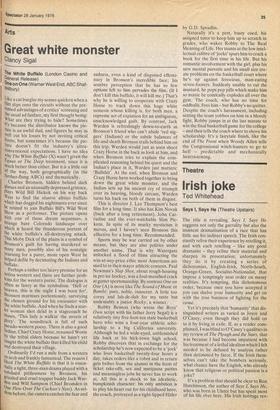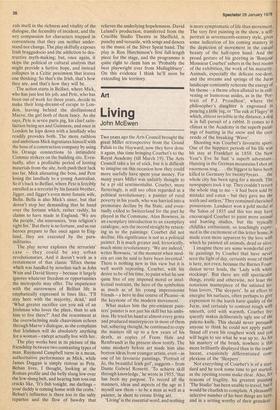Theatre
Irish joke
Ted Whitehead
Says I, Says He (Theatre Upstairs)
The title is revealing. Says I, Says He suggests not only the garrulity but also the insistent dramatisation of a race that has little use for indirect speech. The Irish constantly relive their experience by retelling it, and with each retelling — like any good dramatist — they refine their material and sharpen its presentation; unfortunately they do it by creating a series of dichotomies, English-Irish, North-South, Orange-Green, Socialist-Nationalist, that impose a temptingly neat order on messy realities. It's tempting, this dichotomous order, because once you have accepted it you can shelve your humanity and get on with the true business of fighting for the cause.
Yet it's precisely that 'humanity' that distinguished writers as varied as Joyce and O'Casey, even though they did hold on to it by living in exile. If, as a reader complained, I was blind to O'Casey's qualities in my review of The Pip ugh and the Stars, that was because I had become impatient with his treatment of a lethal idealism which I felt needed to be defused by analysis rather than detonated by farce. If the Irish them selves can't take the bombers seriously, what chance have the English, who already know that religious or political passion is a joke?
It's a problem that should be clear to Ron Hutchinson, the author of Says I, Says He, who was born in Ulster but has spent most of his life aver here. His Irish heritage rev eals itself in the richness and vitality of the dialogue, the fecundity of incident, and the wry compassion for characters trapped in conventions that they can neither understand nor change. The play skilfully exposes Irish braggadocio and the addiction to des; tructive myth-making; but, once again, it skips the political or cultural analysis that might provide a furtive hope, and instead collapses in a Celtic pessimism that leaves one thinking: So that's the Irish, that's how they are, and that's how they will be.
The action starts in Belfast, where Mick, who has just lost his job, and Pete, who has been out of work for three years, decide to make their long-dreamt-of escape to London, leaving behind the disillusioned Maeve, the girl both of them fancy. As she says, Pete is seven parts pig, his chief satisfaction being sex and Guinness; and once in London he kips down with a landlady who readily provides both. The more ruthless and ambitious Mick ingratiates himself with the boss of a construction company by using his Orange connections to intimidate Commie strikers on the building site. Eventually, after a profitable period of looting materials from the site, both push their luck too far, Mick alienating the boss, and Pete losing the landlady to a young Australian. So it's back to Belfast, where Pete is forcibly enrolled as a terrorist by his fanatic brother, Jigger, and Jigger's even more fanatic wife, Bella. Bella is also Mick's sister, but that doesn't stop her demanding that he hand over the fortune which, rather rashly, he claims to have made in England. 'We are the people,' she announces, 'true religion's right fist.' But there is no fortune, and as our heroes prepare to flee once again to England, they are executed by the paramilitaries.
The play never explores the terrorists' case — they could be any urban revolutionaries. And it doesn't work as a restatement of that classic 'fifties theme which was handled by novelists such as John Wain and David Storey — because it largely ignores whatever freedom or opportunities the metropolis may offer. The impatience with the narrowness of Belfast life is emphatically expressed in lines like, 'I'll stay here with the majority, dead,' and 'What greater sacrifice can you ask of an Irishman who loves the place, than to ask him to live there?' And the resentment at the overwhelming male chauvinism echoes through Maeve's dialogue, as she complains that Irishmen will do absolutely anything. for a woman — exdept actually live with her., The play works best in its picture of the friendship between two contrasting types of man. Raymond Campbell turns in a mean, authoritative performance as Mick, while James Duggan is simply riotous as Pete. Behan lives, I thought, looking at the Roman profile and the belly slung low over the low-slung belt, and hearing him toss out cracks like, 'It's fish tonight, me darlings — your daddy is coming home with the crabs.' Behan's influence is there too in the salty repartee and the flow of bawdry that relieves the underlying hopelessness. David Leland's production, transferred from the Crucible Studio Theatre in Sheffield, is punchy and versatile, with songs and dances to the music of the Silver Spear band. The play is Ron Hutchinson's first full-length piece for the stage, and the programme is quite right to claim him as 'Probably the best playwright ever from Mullaghbuoy'. On this evidence I think he'll soon be extending his territory.



































 Previous page
Previous page